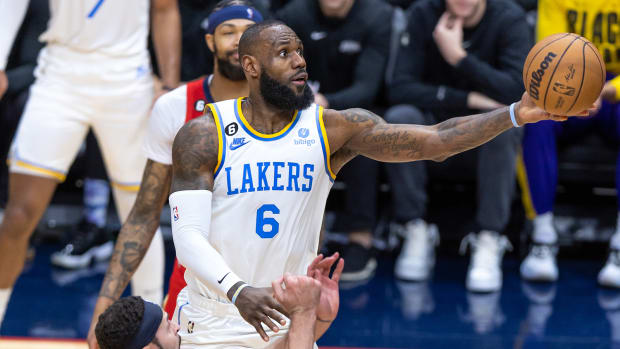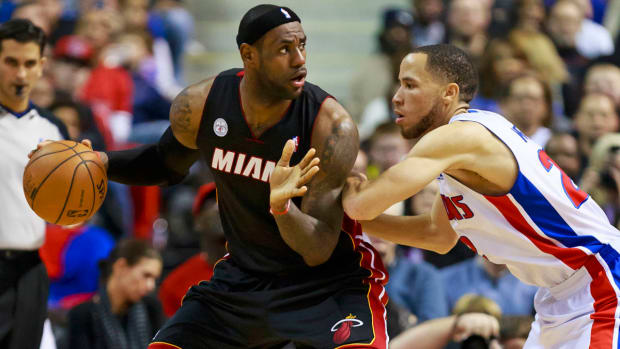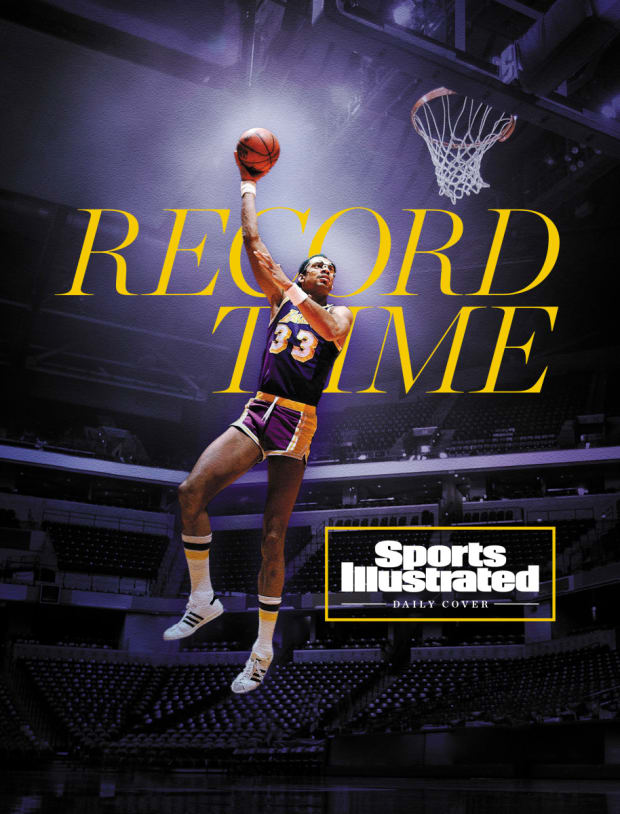LeBron James broke the NBA’s all-time record for scoring on Tuesday night. With the record coming down, it will surely fuel a circular debate that rolls around anytime LeBron hits another milestone or tacks on another title onto his résumé: Is he the greatest of all time?
Here’s the thing, though: Most people seemingly decided where they stood on that question some time ago, meaning the all-time scoring crown itself may not have changed much for those who find themselves entrenched in thinking LeBron, Jordan or Kareem is the best to ever lace them up.

Stephen Lew/USA TODAY Sports
Yet with James’s point total being the focus this week, the scoring accomplishment—when scoring isn’t even the clear-cut best part of his game—underscores that the league has never had a better all-around superstar than James.
At a certain point, it becomes impossible to deny that point—especially as he just recently cracked the top four on the NBA’s all-time assist list. (He’s the only non-guard inside the top 34.) To be there while taking ownership of the scoring list shows an unthinkable level of balance and unselfishness. It also requires the things that are often brought up with LeBron—fully justifying perhaps the greatest teenage hype in modern sports history and his impressive mileage and durability, which have allowed him to play for 20 seasons. (Full credit where it’s due: It’s been chronicled at length that James spends upward of seven figures per year to keep his body in optimal condition, through diet and training.)
But it’s not just the durability, either. It’s the ability to continue to produce at this level in a multifaceted way—by scoring, by passing, by playing different spots on the floor—at age 38.
He isn’t the world’s best player night to night anymore—you’d have to think for a moment about whether he’s one of the league’s five most impactful players at this point—but after an unprecedented 15 straight years or so of holding down that spot, the run had to end at some point. Either way, to be 20 years in and still notching 30 points, eight boards and seven dimes per night is ridiculous. It’s more impressive in light of the fact that, over those 20 years, he’s played an additional three full regular seasons’ worth of playoff contests (3.24 extra seasons, to be exact).
There have been plenty of years where you could have considered James the best passer in the sport. And he’s not merely someone who’s thrown dimes out of mere pick-and-roll sets. High-level metrics show he was essentially throwing passes farther than just about anyone on average and often putting steam on those offerings. He’s talked at length of speaking with teammates about how and where they like the ball to optimize assist opportunities, so they can be fully prepared to shoot by the time his pass arrives. Back in 2020, at age 35 and for the first time in his career, he led the Association in assists with 10.2 per night.
He’s been a wing stopper on the defensive end, using his size and speed to shut down MVP Derrick Rose in the late stages of the 2011 Eastern Conference finals and finishing runner-up to Marc Gasol in the Defensive Player of the Year award in ’13. Even in these more recent years, with defense being less of a calling card than in those prime years, he’s generally been quite good on that end, albeit from a different spot much of the time. As a power forward and occasional center this season and in 2021–22 with the Lakers, he’s held opposing shooters 6 and 8.7 percentage points beneath their averages when near the rim, respectively, while defending nearly five rim tries per game. (This is amazing, considering Anthony Davis has missed considerable time and hasn’t been there to scare off would-be shooters along with him.) And just in case you’re wondering: Those numbers are on par with his first three seasons as a Laker, too, indicating that there’s been almost no drop-off when serving as a last line of defense.
But the thing he’s making history for, of course, is his scoring. And for all his well-rounded playing attributes, that’s the area in which he’s shown perhaps his greatest evolution.
When he was a rookie, James didn’t know how to use his physical gifts to his advantage on the court and struggled from virtually everywhere. He wasn’t all that effective from the paint and had a shaky jumper from both midrange and the arc, leaving him 72nd in three-point percentage of the 74 guys who launched at least 200 triples back in 2003–04.
It didn’t take long for him to show progress, though, as he went from a 60% shooter inside of three feet as a rookie to a 72.5% shooter from there in Year 2. That, combined with him shooting better from every other single area of the floor, started him on a journey of what at times has seemed like near-annual improvement as a scorer. We saw him as a member of those early Cleveland teams where he had to average 30 and create everything himself. We saw him move to Miami, which, with Dwyane Wade and Chris Bosh, forced him to play off the ball a little more. (We saw that unlock his driving skills, as the Heat put ample shooting around him, forcing defenses to pick their poison.) We even saw James post a 40% season from deep himself as a member of the Heat, who rolled out some spaced-out, unguardable lineups.

Rick Osentoski/USA TODAY Sports
He’s showcased the old-man game, where he backs defenders down relentlessly until they have nowhere to go and find themselves under the basket. There’s been the smooth fadeaway, which seemingly all the greats—Michael, Kobe, Dirk—lean on as they get closer to retirement. We’ve watched LeBron make a living off the deep, left-wing three for several years now. Over that span, the long-distance looks have become as commonplace as James’s tomahawk dunks.
It’s hard to believe that this has all been done throughout a single player’s career. But more than any superstar we’ve ever seen, James has illustrated his greatness by shape-shifting the scope of not only his scoring, but his game as a whole.
Whether or not you think he’s ultimately the greatest player to ever suit up, there’s a good chance we’ll never see another superstar who puts it all together—scoring and passing at such elite levels, defending totally different positions the way he has, and doing so for a fifth of a century—as well as James has. It’s been incredible to witness. Enjoy it while you still can.
Meat and potatoes: Good reads from SI this past week

- With LeBron on the cusp, our Howard Beck wrote a terrific Daily Cover piece on the total absence of fanfare back in 1984 when Kareem broke the record. Among the really strange circumstances: The game—a home tilt for the Utah Jazz—was played in Las Vegas, in the same arena Summer League games are currently held in. Beyond that, Howard wrote on Jacque Vaughn and why he’s the ideal coach to lead the Nets through their latest mess.
- Rohan Nadkarni wrote a bunch of stuff this past week. He tackled the Lakers’ need to aggressively pivot to a secondary plan following missing out on trading for Kyrie. He wrote on the Nets’ clear need to move on from Irving, and then graded the deal between Brooklyn and Dallas for the star guard. Rohan also laid out a handful of fun potential trade destinations for OG Anunoby and opined on Dillon Brooks and the Grizzlies, saying the group has worn out its welcome since bursting onto the scene.
- Chris Mannix also tackled the hot topics of the week: the Mavs’ rolling the dice on Kyrie and the baggage that comes with him; an obit of sorts for the roller-coaster tenure that Irving had in Brooklyn; and the referees’ response to their blown call involving LeBron and the Lakers last week.
- I wrote about Giannis Antetokounmpo, who’s been loudly making the case that he’s still the best player in the world after logging three 50-point games in his past 11 outings.
- Our draft expert, Jeremy Woo, analyzed Arkansas guard Anthony Black as someone who could go near the top of the draft and then did a writeup on Michigan’s Jett Howard—the son of Juwan—as an ascending one-and-done prospect, among others.
- Clare Brennan wrote on the wild ticket prices that are out there in response to LeBron’s pursuit of the scoring record.







